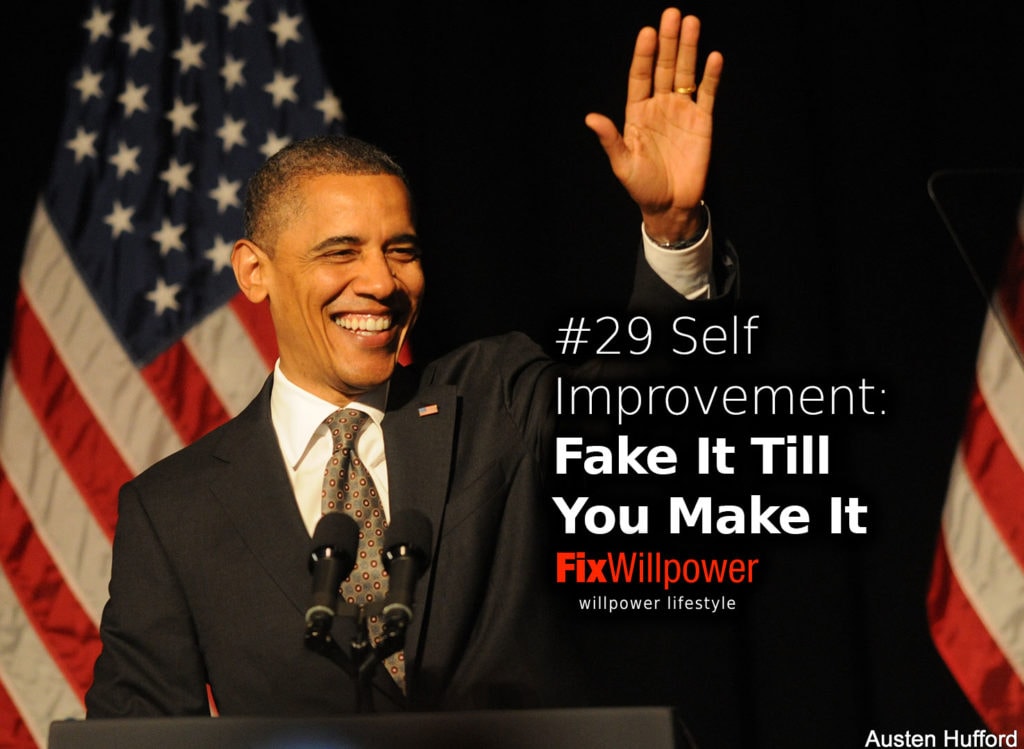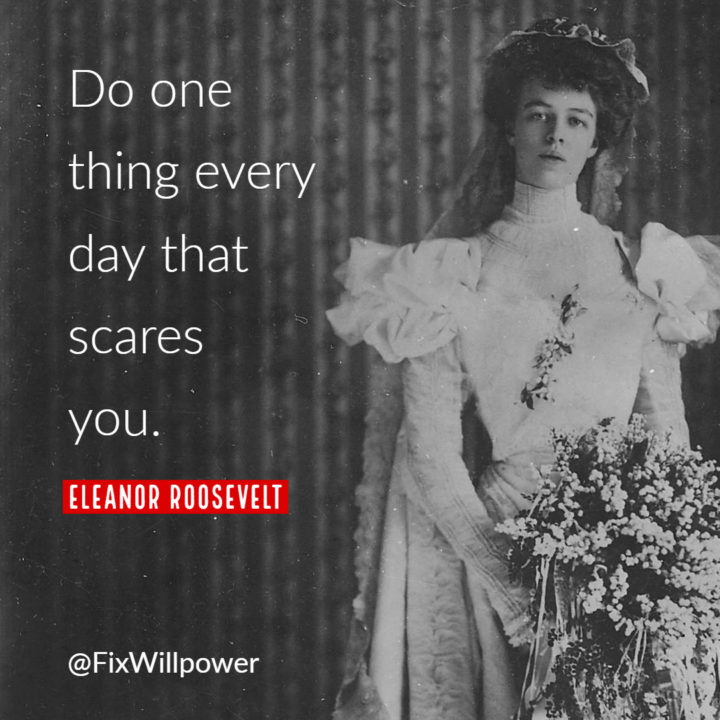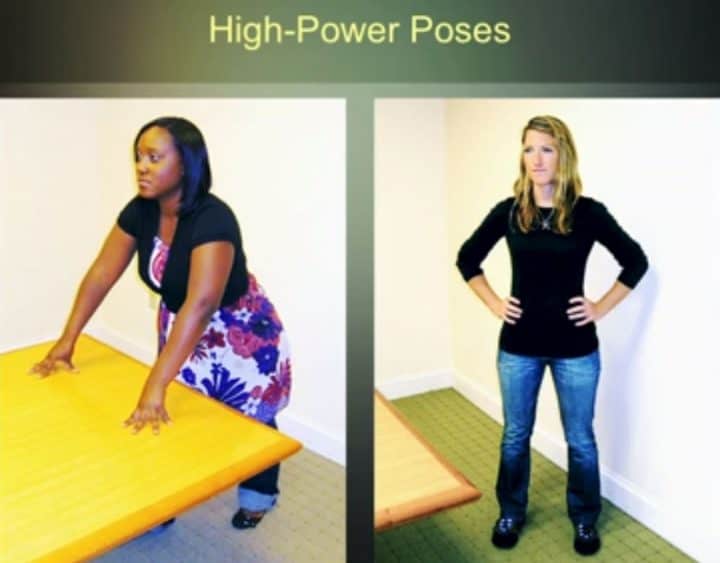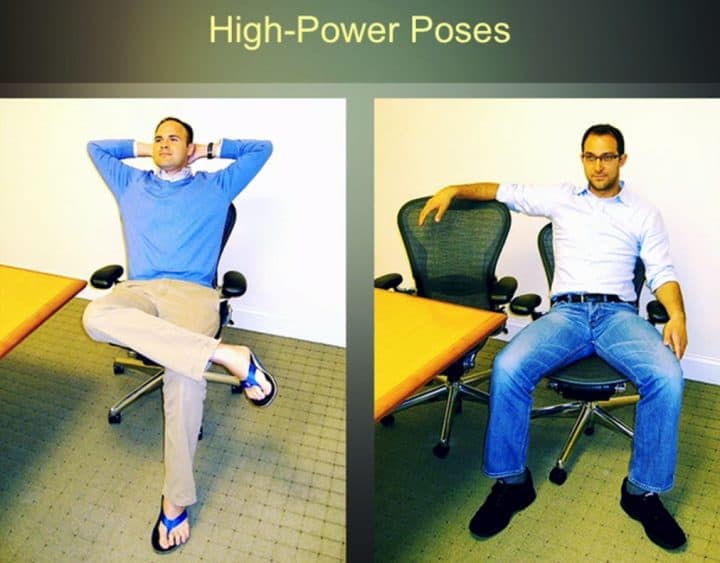Some people stand out.
Do you want to stand out?

They are high powered when speaking to hundreds or thousands of people. Some have physical influence that you can feel when they enter the room, or maybe they are really charming. Still, others are confident when presenting, acting, speaking, or doing any other frightening stuff.
So, how come these people are so far above others in these situations. Well, most likely they are not. They are just faking it, and you are buying it.
Psychological research
A growing body of psychological research shows that the changes that you willfully force on your body influence your mind to follow suit. As your mind changes your behavior changes, and that leads to real-world effects where people perceive you differently.
For example, one of the most feared activities is public speaking (and interacting with strangers). Some surveys have found that people fear public speaking more than death. The fear of public speaking is quite reasonable. When you speak publicly, you will be mocked afterward till the end of days. We fear it because in prehistoric times when we were cast out of the group then the chances of survival dropped drastically.
Our brain still thinks this is the case!
No! People are thinking mostly about themselves, and nobody will remember your performance.
There are two ways you can make your life better by faking it until you make it.
The first is to change your inner self and mood. You could use self-affirmations to build up confidence.
The second is to create change and act in a way that affects how others perceive you. Sometimes, the two overlap as your better mood will translate to a different perception of you by others.

Do one thing every day that scares you. ~ Eleanor Roosevelt
Smile to feel better
You can improve your self-image by forcing a smile on your face. Some research shows that this works even when people are unaware that they are making a smiley face. Researchers made the participants put the pencil between their teeth so that the facial expression was smiling. It will work even if you don’t believe it. In a study from the University of Kansas; smiling will lower your heart rate and stress levels.
I have tested it while running on a treadmill. I rarely have any expression on my face when I run and listen to audiobooks or music. But when I force a smile, then my heart rate drops a little bit. Definitely not scientific, but consistent effect.
Forcing a smile is a clear example of “fake it till you make it.”
Optimism.
You can change your outlook on life by changing the thought patterns to less negative thinking( Read how to change negative self-talk). Instead of considering the most horrific and devastating outcomes of the date you are going to, think about what good things can happen and what you can do to improve the experience.

I love those who can smile in trouble. ~ Leonardo da Vinci
Here’s a trick you can do with smiling.
Put a big grin on your face just before you enter a room. Let it go in a way that people in the room will see it fading when you enter. This is more subtle than just forcing a smile on everybody you meet.
Turn Anxiety into Excitement
It is normal to feel anxious when you are in difficult situations. Accepting anxiety as part of doing things that help you grow lets you get accustomed to it.
Notice the feeling, understand that it’s completely normal, and don’t let it overwhelm you.
One trick I learned about anxiety is to swap it out with excitement.
I read somewhere that the physical manifestation of anxiety in our body is almost the same as excitement. So, when you feel anxious, think about it as excitement. It takes some practice, but you can do it.
I even have sticker on my computer screen that says, “excitement!”

Without leaps of imagination, or dreaming, we lose the excitement of possibilities. Dreaming, after all, is a form of planning. ~ Gloria Steinem
Self-esteem with “you can do it” attitude
The main problem is that we compare ourselves to others and see how easily everything happens to others. The performance we see is an illusion and comes from the fact that we mostly notice exceptional occurrences. We see when someone is really good but forget the much more prevalent average performances.
But consider how often do you see real social failure, it’s actually pretty rare.
We often have lower self-esteem than we deserve because we compare the peak performance of others to our own self-doubt and failures.
Such a comparison is unfair!
Stop it!
If a teacher graded students this way, we would fire him.
The Impostor Syndrome
Sometimes you may feel that you are not up to the task. You may feel your command of the situation or topic is lacking.
I have taken part in the discussions where I have felt that the concepts are just too big for my head. In those cases, I’ve tried to concentrate on the bits I know and act confidently. Feeling that you are not up to par is the “impostor syndrome.” As time passes other participants reveal that they are actually on the same level as you are, you realize that almost everyone is a fraud and you fit in just right.
Almost everybody has the impostor feeling on some level or another.
This is not fraud. It’s the level most people operate on.
I have written 11 books, but each time I think, ‘Uh oh, they’re going to find out now. I’ve run a game on everybody, and they’re going to find me out.’ ~ Maya Angelou
To boost your confidence, just think about the fact that there was a time when nobody in the room had done X (talk, walk, write, drive, solve calculus equations in their head, etc.).

To feel brave, act as if we were brave, use all our will to that end. — William James
The Illusion of Transparency
In your head, you have everything there is to know about you:
- How nervous you are
- How well prepared you are
- What you don’t now
- What your experience level is
You know everything there is to know about you in any certain situation. We often tend to think consciously or not that all that is obvious to other people, too.
They don’t!
It’s called the Illusion of Transparency effect and everybody has it.
The illusion of transparency is a tendency for people to overestimate the degree to which others know their personal mental state. Another manifestation of the illusion of transparency (sometimes called the observer’s illusion of transparency) is a tendency for people to overestimate how well they understand others’ personal mental states.
Body language
A large part of the message we project into the surrounding environment comes from the way we carry ourselves. Do you take up lots of space, walk confidently in the center of the room, and look people in the eye? We immediately recognize the powerful from the weak.

Stand up straight with your shoulders back.
But the trick is that you can fake it, and nobody will be the wiser. It usually starts with self-esteem. You have to do something you have never done before. You try to make yourself smaller and become invisible. You are terrified that someone will find out you are an impostor. But… you are in luck because everybody else in the meeting is thinking about the same thing, how to hide the fact that they are faking something.
Always act as if you believe in yourself!
Just the physical act of appearing confident will make you mentally more confident. And the only way you can beat this is facing the fear until you become the person you impersonate.
How to make yourself feel more powerful?
Before even going to the meeting or presentation take a few minutes and assume power poses. Below you find the screenshots from Amy Cuddy’s TED talk depicting the most common power positions. Just two minutes using power poses alone made the candidates perform much more confidently on the job interview. That’s all you have to do in the beginning.
Two minutes of power poses. Alone, before important events.
In one study subjects were asked to assume high power pose standing up with your hands on your hips or low-power pose of touching your neck while sitting and hold them for two minutes. The tests after the 2 minutes showed that participants with the high-power pose showed a 20% increase in testosterone and lower levels of cortisol. Others who held the low-power poses had a drop in testosterone and a peak in cortisol.
Important note: Some follow-up studies could not replicate the results of the power poses study. Cuddy’s new paper published in March 2018 in Psychological Science offers fresh evidence that adopting an expansive posture (power pose) makes people feel more powerful. However, the result that the power poses lead to hormonal change didn’t show up in the new study.
Here are the high power poses from the TED talk:



When you finally get to the speaking engagement or meeting, use big sweeping gestures and open poses that take up space. Acting like you own the place will establish your presence, and your audience gets the message they are dealing with a confident person whom they have to pay attention to.
The audience is more influenced by how they feel about you than by what you’re actually saying. The connection with people and the presence you have in the room are much more related to the outcome than the awesomeness of your ideas.
People underestimate the powerful influence of warmth and overestimate the value of competence.
Don’t fake it with bling
Important! You know these pictures on Instagram with fast cars, wads of money and other items that reek of low self-esteem? Do not try to fake it with external symbols, expensive suit, Rolex watch, or a car you can’t afford.

Research shows that you will feel even worse after that:
Multiple experiments show that within-domain compensation impairs subsequent self-regulation on behaviors ranging from resisting tempting but unhealthy food to performing cognitively taxing tasks.
Combine this with self-affirmations, and you are on your way to a much more fulfilling interaction with other people.
How to get to the “when you make it” part
There’s no risk in speaking up. Do it! Take charge and others think you were born for this?
Use self-affirmations to improve your mood and trust in yourself.
Turn anxiety into excitement. You can use self-affirmations for this.
Smile! Smiling will make you more confident. Smiling will make others think you are in control of the situation.
Avoid the impostor syndrome. Others are almost always closer to your level than you think. And there’s nothing impostor about experimenting and giving your best effort.
The illusion of transparency makes you think everyone is seeing right through you. Your every doubt and weakness are out there visible to all. Nope! Don’t worry about it, you are like a closed book.
Stand up with your shoulders back. The research on power poses may be spotty, but when you walk into a room like you own the place, people will perceive you as more confident.
Now, think about all the times you made it. Think about all the things you can do. And smile. Always do that before important meetings and events.
____________________________
Image: Obama Speaks at Henry Ford by Austen Hufford
Image: Eleanor Roosevelt
![Read more about the article What are the Most Important Things in Life? [2025]](https://fixwillpower.com/wp-content/uploads/important-things-in-life-429x314.jpg)
![Read more about the article Call An Old Friend to Keep in Touch and Build Your Network [STEPS]](https://fixwillpower.com/wp-content/uploads/call-an-old-friend-429x314.jpg)
![Read more about the article Take a Day Off to Enjoy Your Life [Regularly]](https://fixwillpower.com/wp-content/uploads/take-a-day-off-429x314.jpg)
![Read more about the article All the Ways Attitude of Gratitude Improves Your Life [VIDEO]](https://fixwillpower.com/wp-content/uploads/attitude-of-gratitude-improve-your-life-429x314.jpg)
Pingback: The power of vulnerability: Brené Brown [TED VIDEO] | Fix Willpower